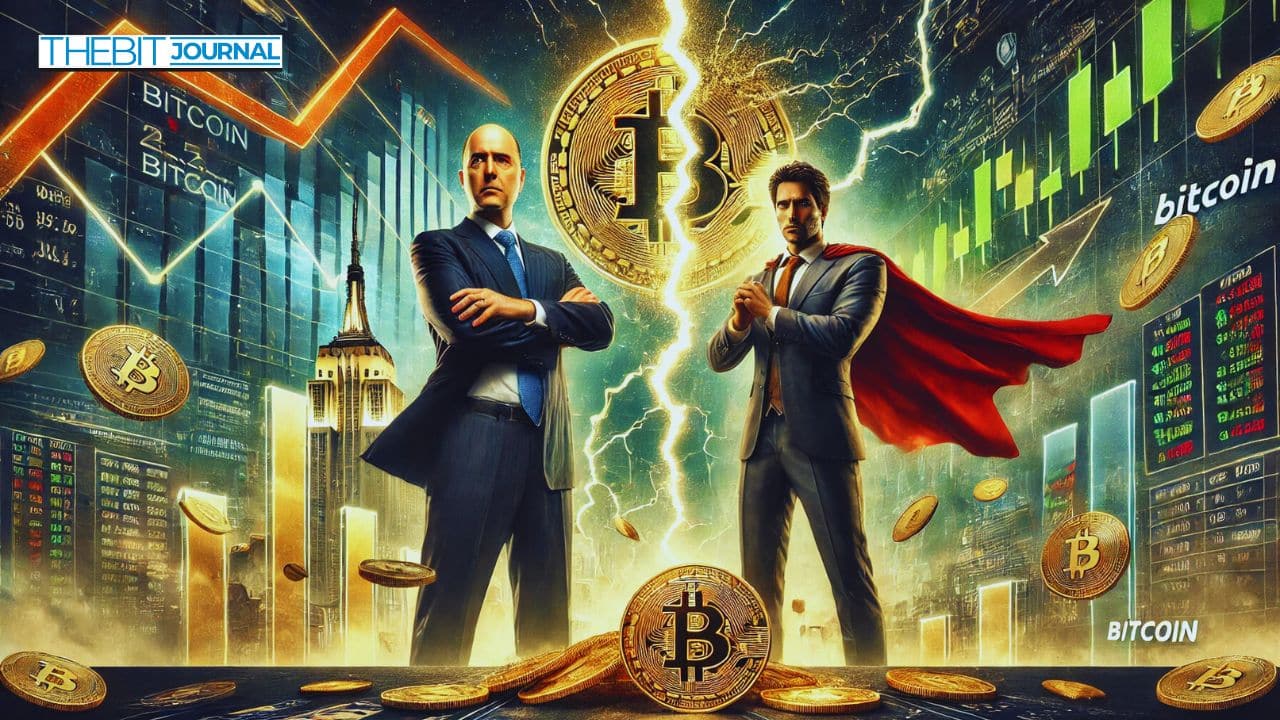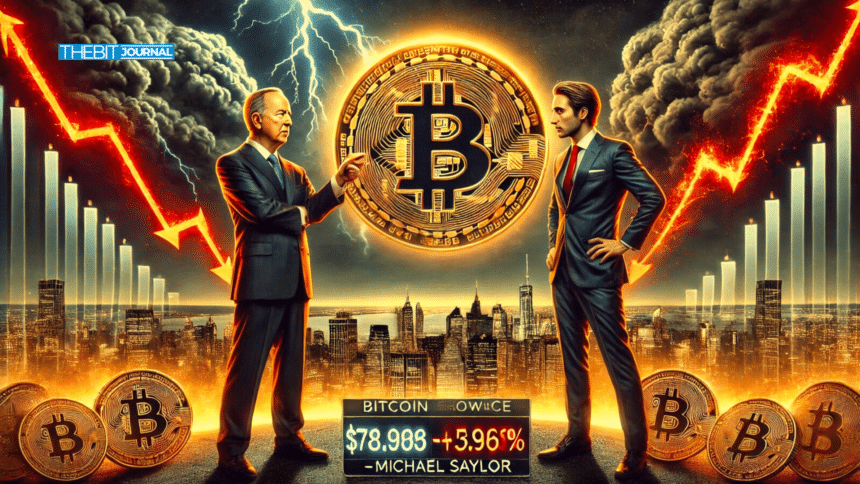The market is still volatile, with Bitcoin dropping from its previous highs and now trading under the $80,000 mark. This is causing Peter Schiff and Michael Saylor to once again clash in the public eye. Peter Schiff, a harsh Bitcoin skeptic and CEO of Euro Pacific Capital, has once again gone after Saylor’s brash Bitcoin buying approach.
The tweet was sent at the same time Bitcoin traded at $78,950.85, a drop of 5.36% in the last 24 hours. Schiff decided to take his feud with Saylor to Twitter, casting more than one challenge at Saylor.

“Now that Bitcoin is under $80K, if you want to stop it from crashing below your average cost of $68K, you might as well use your ‘borrowed money’ today and go all in,” challenging Saylor to take on what he perceives to be the risks Saylor has with his aggressive approach to trading
Bitcoin Price Breakdown: A Closer Look
| Date | Bitcoin Price (BTC) | 24-Hour Change | Market Cap | 24-Hour Trading Volume | 7-Day Price Change | 1-Month Price Change |
| April 7, 2025 | $78,950.85 | -5.36% | $1.56 Trillion | $42 Billion | -10.12% | +2.55% |
| April 6, 2025 | $83,435.92 | -2.03% | $1.64 Trillion | $35 Billion | -8.92% | +1.92% |
| April 5, 2025 | $85,110.21 | -1.74% | $1.70 Trillion | $40 Billion | -5.88% |
Concerns About Bitcoin’s Volatile Price Movements
The volatility of Bitcoin’s price is not new, but its recent drop below $80,000 has created a serious problem for large investors like Saylor. Currently, Bitcoin has a market capitalization of $1.56 trillion and a trading volume of $42 billion. The crypto market is still very active; however, the drop of 5.36% over the past 24 hours indicates the volatility that many critics have highlighted.
Peter Schiff narrative stems from the assertion that Bitcoin is not the safe haven it is marketed as.
In his defense he commented, “But Bitcoin was sold as a safe haven/store of value,” Peter Schiff noted in a later tweet. “If during market sell offs it crashes more than other assets, what value does it offer investors?”

This captures the essence of the ongoing debate between Bitcoin advocates and skeptics like Schiff.
Peter Schiff Standoff with Saylor: A Gamble with Extreme Risk?
The dispute featuring Peter Schiff and Michael Saylor has been on the lips of many cryptocurrency communities and continues to stir controversy to this day. Peter Schiff can be seen as an opponent of Bitcoin, and his position makes sense given Saylor’s exploits with MicroStrategy, whose balance sheet is into Bitcoin. His investments seem to be both reckless and overly ambitious, especially given the current market dynamics.
The harshest of Peter Schiff takes has been: “It will end with the bankruptcy of MSTR,” when asked about Saylor’s exploits with MicroStrategy.
Gaining considerable debt as well as buying Bitcoin at the height of its price is an ill-fated venture, while the general trend and sentiment in the market does not seem positive. This statement demonstrates how traditional investors view Saylor’s strategy, saying it is fraught with major pitfalls.
Is Saylor’s strategy built around Bitcoin an unnecessary risk?
Saylor, ever since 2020, is reported to have claimed several times that Bitcoin acts as a hedge against inflation. His multiple purchases have led to billions of dollars of Bitcoin being added to MicroStrategy’s purse, along with continuously high figures in cryptocurrency storage. As the price of Bitcoin continues to oscillate, some financial watchers see Saylor’s heavy dependence on the digital currency get derailed. This explosive rise in financial support for Bitcoin adds significant risk to the investment.

Regardless of the odds, Saylor remains unfazed. The investor intends to hold his position in Bitcoin, trusting that it will appreciate over a prolonged period. Even as Bitcoin struggles to maintain its value near $80,000, Saylor’s conviction on the stance he has taken only seems to strengthen. For Saylor, Bitcoin is far more than an investment; it is a revolutionary technology that can alter the course of the global economy as we know it.
Bitcoin’s Position in the Economy
In the meantime, amid the Saylor-Schiff dispute, it is equally important to acknowledge the fact that Bitcoin has gradually evolved from being an alternative form of digital currency into a globally acknowledged asset. Bitcoin has become mainstream and attracts institutional investors as well as large corporations and retail traders. Despite its increased acceptance and growth, Bitcoin’s volatility is still one of its most critical aspects, particularly to those taking an even slightly more traditional approach to investing.
Bitcoin’s adoption is accelerating as a store of value and a possible inflation hedge, and has been crucial to its price increase. But while the price of Bitcoin continues to be volatile, the question is: will it be able to live up to the promises delivered or will the volatility be its Achilles’ heel?
Conclusion: The Future of Bitcoin and Saylor’s Strategy
Peter Schiff’s Bitcoin critique, juxtaposed with Michael Saylor’s defense, stretches beyond Twitter. It shows the underlying fracture in the financial sphere regarding Bitcoin’s sustainability. Saylor is adamant about sticking with his Bitcoin strategy, while critics like Schiff claim that the risks overshadow the potential upsides and pour caution on the situation. With the rate of Bitcoin sitting just under 80,000 and the ongoing debate on whether it will rally or slip into a bearish spiral, the outlook remains uncertain.
Odds are in Saylor’s favor if he walks away with his bets on Bitcoin while the price skyrockets, but should the cryptocurrency falter he stands to risk devastating repercussions for MicroStrategy and the crypto market at large. This leads one to wonder if the bet would be a revolutionary turning point or a reckless miscalculation.
FAQS
Q1: How does Peter Schiff assess Bitcoin?
A1: He is considered one of the most vocal critics of Bitcoin. In his view, Bitcoin is an extremely volatile asset with no value during bear markets. As far as his opinion goes, it sure doesn’t help one’s attempts at preserving financial value.
Q2: Why is Bitcoin considered a volatile asset by Michael Saylor?
A2: Since 2020, Saylor has held the position that Bitcoin is strategically acquiring gold and acts as a shield against inflation, thus regularly purchasing it for MicroStrategy.
Q3: What results could be expected of MicroStrategy in the case where Bitcoin’s price steadily drops?
A3: Should the price of Bitcoin experience a persistent downward trend, it could pose consequences for MicroStrategy’s financial health, especially given their substantial debt burden from acquiring Bitcoin. The company could then face these prospective financial constraints.
Clarification of Related Concepts
Bitcoin: A digital currency that is regarded as a store of value and functions independently of any centralized control.
MicroStrategy: A business intelligence firm led by Michael Saylor, who has significantly increased the company’s Bitcoin holdings in recent years.
Volatility: The measurement of the changes in the price of an asset over a period of time is typically associated with higher risk.
Store of Value: A type of asset that can keep its value for a long time and helps in preserving wealth.
References
- Peter Schiff’s official Twitter account
- Market data from CoinMarketCap
- MicroStrategy official reports
Follow us on Twitter and LinkedIn and join our Telegram channel to be instantly informed about breaking news!


























